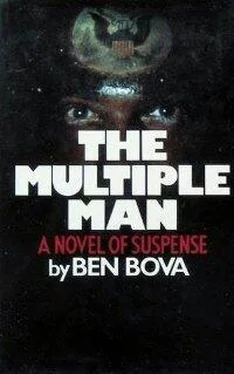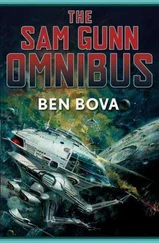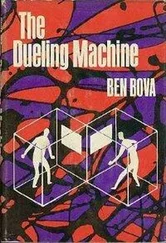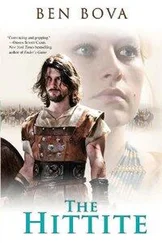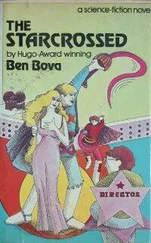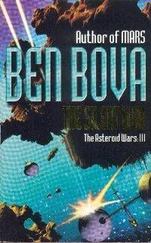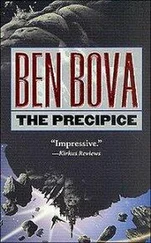“No.” The doctor’s voice seemed to be coming from far away. “They… are being… murdered.”
His head lolled back. His mouth sagged open. His chest stopped heaving. General Halliday looked up at me, and damned if there weren’t tears in his eyes.
Only twice in my life have people close to me died. Both times by chance I was out of town when it happened. And I stayed away. I avoided the wakes, the funerals, the sobbing relatives and somber friends. It all seemed so pointless, so futile. Maybe I was scared, deep inside. Maybe I saw myself in the coffin, or was afraidI would.
I stayed for Peña’s funeral. I’m not sure why, but I stayed. The General’s people did it all very swiftly and efficiently. The old man was buried in the woods behind the General’s main house. They had to clear off the thinning layer of snow that was still on the ground to dig the grave. The soil was frozen; the digging was hard work.
It was a very small band of mourners. The General, Robert Wyatt, a few of the General’s hired hands, Peter Thornton from North Lake—trying not to look pleased that he was now in charge of the lab—and me.
And the President.
A local minister said a few hushed words and they lowered Peña’s coffin into the ground. I knew instinctively that there were already three other graves under the snow, with flat little markers that said “J. J. Halliday.” A fourth one would be dug soon.
That night the General, Wyatt, the President, and I ate a quiet dinner together. Thornton had flown back to Minnesota immediately after the burial service. The President turned out to be James Jeffrey, the specialist in defense policy.
I still couldn’t quite get it through my skull that he was one of eight identical clone brothers; one of four remaining brothers. Hell, he was the President! Every bone, every fold of skin, every gesture, every nuance of voice: the President. His eyes, the way his hair flopped over his forehead, the kind of grin he gave me as he kidded me about reading the old Watergate tapes for a lesson in how not to cover up a White House secret. He was the President, the only one I’d known. There couldn’t be another one just like him. My brain and guts and soul refused to accept the idea. He couldn’t be one of a set of eight. Or seven. Or four. We were pretty somber as we sat down to eat in the oak-paneled dining room. But as that same robot-like Oriental butler served us steaks, Jeffrey began telling his father about the arguments he had been having with his brothers over the Iran-Kuwait war.
“We’ve got to be ready to go in there,” he said fervently, “in force. We’ve got to be able to protect our own interests.”
The General nodded agreement. I worked on my steak and kept quiet.
“But do you think Johnny understands that?” Jeffrey grumbled. “He’s more worried about losing a few votes in Congress than losing the whole Middle East.”
“John knows the political infighting,” the General said. “If he doesn’t think…”
“I’ve made my own assessment of the politics,” Jeffrey interrupted. “I’ve dealt with the Senate committees. And the House, too. I could swing the Hill, if John would give me a chance to try.”
The General looked up from his plate. “It’s John’s job to make the political decisions. If he thinks the Congress would block you, you’d better go along with his estimate of the situation.” Jeffrey cocked his head slightly to one side. Just like the President. Dummy! I hollered at myself. He is the President. One-eighth of the Presidency, at least.
With that smile I knew so well, the smile that meant he was going to say something unpleasant but didn’t want you to get upset about it, Jeffrey answered his father. “I don’t think John’s qualified to make this decision. He doesn’t understand the details of the military situation as well as I do. Nor the economic situation, for that matter.”
They discussed—or argued, depending on your boil-over threshold—the situation right through dessert. Just a quiet little family debate. Like father and son arguing over who’s going to use the family car tonight. Except that the son was the President of the United States, the subject was whether or not we will enter the Iran-Kuwait war, and the men he was arguing against were his identical clone brothers who were back in Washington.
My brain was telling me that I had to accept the reality of the situation. But the rest of me still didn’t want to deal with it. You can know something is true, intellectually, and accept it and even deal with the reality as part of your world-view, on which you base your work. But that doesn’t mean you believe it’s true, down at the deepest level of your existence. Inside me, in that special subbasement where I keep all my old Sunday school lessons and nightmare terrors and fantasy desires, down there the real, secret, deepest me hadn’t yet accepted what my brain had already filed away in one of its neat little storage cabinets. I knew the President had been cloned, and there were four identical brothers in the White House. I knew there had been seven, up to a few months ago. I knew it.
But I didn’t believe it.
I flew back to Washington that night in one of the General’s private supersonic jets with the President. We sat side by side in the most luxurious reclining chairs I’d ever flown in, and watched the television screen built into the forward bulkhead of the passenger compartment. The President was delivering a speech, live, from the White House. He was signing the new Economic Incentives Act, and taking the opportunity to coax the Congress for even more action on his domestic programs.
At forty-two thousand feet above the prairie wheat basket of the nation, I sat beside the President and watched the President on TV, live.
“…and although this act will go a long way toward turning urban adults into taxpaying, productive citizens rather than welfare recipients, we still have a long way to go on education and day care facilities for the young people of the core cities…” Carrot and stick. That patented Halliday smile and the constant urging to do more, go further, dare higher.
“They say the poor are always with us,” the President concluded. “Perhaps that’s because those who are not poor have never put their whole hearts and minds to the task of eradicating poverty. We have the wealth, we have the technology, we have the knowledge to lift the blight of poverty from our cities and countryside. The question is, do we have the heart, the soul, the will to do it? That is a question that not even the President can answer, my fellow citizens. Only you can answer it. Thank you. Good night and God bless you.”
I turned my head as the image faded on the screen and saw the President grinning to (at?) himself. “He’s got style, John has,” Jeffrey told me. “I’ve got to deliver a speech on defense policy next week at West Point. I’ll never be able to put it across the way he does.” He sounded almost wistful.
“Look at it this way,” I suggested. “Nobody’s noticed the difference between you.”
That made him happy. I tried to get him to talk about the deaths of his brothers, whether he felt they were natural or not. He evaded my attempts, finally cranking his chair back and closing his eyes in a convenient nap.
When we landed, I saw how ridiculously easy it is for a man who looks exactly like the President to get through National Airport and into the White House without being detected. The plane merely taxied to a small private hangar, and we stepped from the jet’s hatch to a waiting limousine. The only people in the hangar were the plane’s two-man crew, the chauffeur, and two armed security guards. All of them were General Halliday’s hand-picked employees.
Читать дальше
